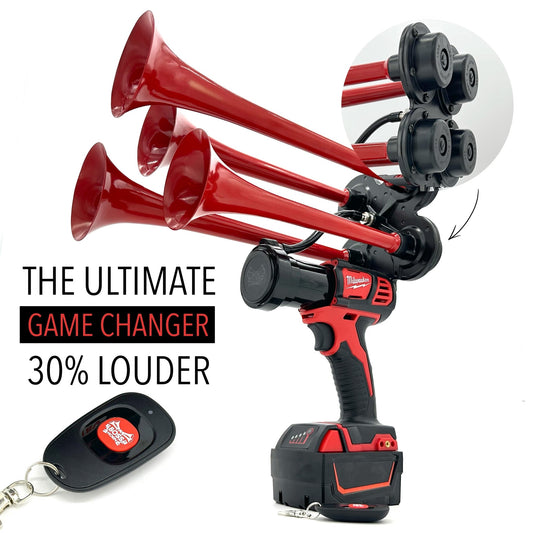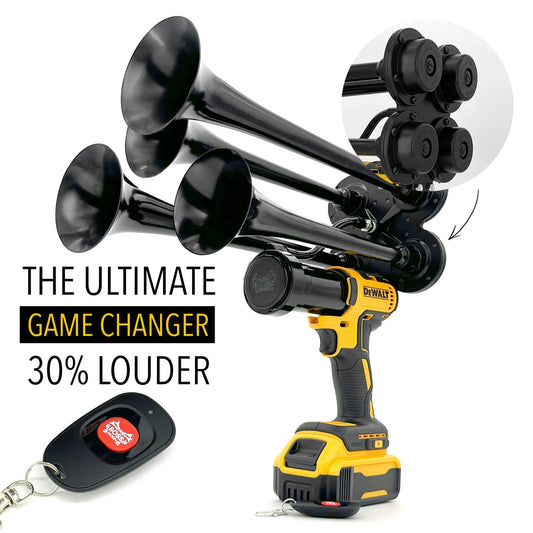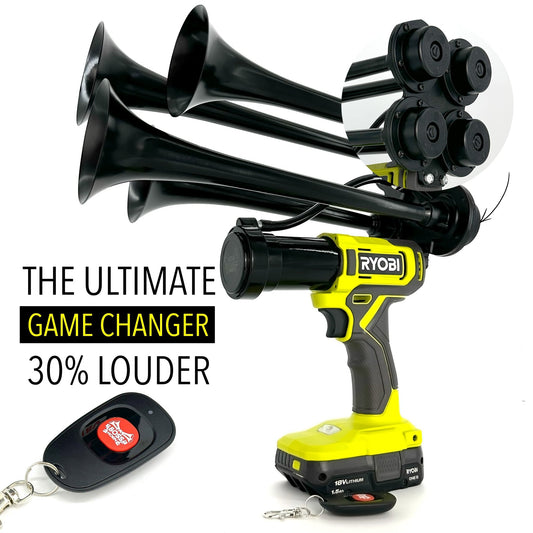A truck's ability to produce a loud and attention-grabbing sound is crucial for safety on the roads. Without this, drivers would have a difficult time alerting others to their presence, especially in noisy and chaotic environments. The device responsible for creating this powerful and distinctive sound is a vital component of a truck's overall function. It has evolved significantly over time, from mechanical to electronic systems, making it more efficient and reliable today.
The concept of producing a sound to communicate with others on the road dates back to the early days of horse-drawn carriages. In those times, a simple bell or horn was used to alert pedestrians and fellow travelers. However, as technology advanced and the number of vehicles increased, a more robust and effective way to generate sound became necessary. This led to the development of the modern-day truck horn compressor, which is now an integral part of trucks worldwide.
Truck horn compressors work by taking in air from the surroundings and compressing it under high pressure. This compressed air is then released through a series of valves and pipes, creating a loud and attention-grabbing sound. The force behind this sound can reach more than 150 decibels, equivalent to the volume of a jet engine at takeoff. This power allows truck drivers to effectively alert pedestrians, other drivers, and even animals of their presence, mitigating the risk of accidents.
In recent years, truck horn compressors have undergone significant advancements to address environmental concerns and minimize noise pollution. Modern compressors are designed to be more energy-efficient, reducing the strain on a truck's electrical system. Additionally, sound dampening technologies have been implemented to lessen the impact of the horn's noise on surrounding communities.
One intriguing statistic reveals the importance of truck horn compressors in ensuring road safety. According to a study conducted by a major insurance company, a significant percentage of accidents involving trucks occur due to a lack of communication between drivers. Implementing effective and audible warning systems, such as high-quality horn compressors, can significantly contribute to reducing the number of such accidents.
In conclusion, the evolution and significance of truck horn compressors cannot be underestimated. These devices have come a long way, enabling drivers to communicate effectively on crowded and noisy roads. The advancements made in their design and functionality have not only enhanced road safety but also addressed concerns regarding noise pollution. As technology continues to progress, we can expect even more efficient and environmentally friendly truck horn compressor systems in the future.
What is a truck horn compressor and how does it work?
Types of Horn Compressors
When it comes to truck horns, having a reliable and efficient compressor is key. There are several types of horn compressors to choose from, each with its own unique features and advantages.
Air Horn Compressors
Air horn compressors are a popular choice among truck owners due to their versatility and power. These compressors use compressed air to create a loud and attention-grabbing sound. They are typically powered by the vehicle's electrical system and can be easily installed in various locations on the truck.
One advantage of air horn compressors is their ability to produce a strong and sustained blast of sound. This is especially useful in situations where the truck needs to emit a loud warning signal, such as when passing another vehicle or approaching a blind curve.
Compact Horn Compressors
Compact horn compressors are ideal for truck owners who have limited space or prefer a discreet installation. These compressors are designed to be small and compact, making them perfect for trucks with limited mounting options.
Despite their compact size, these compressors still deliver a powerful sound output. They are often used in conjunction with smaller-sized truck horns to create a loud and attention-grabbing sound.
Electric Horn Compressors
Electric horn compressors are another popular choice among truck owners. These compressors are powered by the vehicle's electrical system and are known for their reliability and ease of use.
One advantage of electric horn compressors is their low maintenance requirements. They do not require air tanks or additional components, making them a hassle-free option for truck owners.
Factors to Consider
When choosing a truck horn compressor, there are several factors to consider to ensure you make the right choice for your specific needs.
- Sound Output: Determine how loud you want your truck horn to be and choose a compressor that can deliver the desired sound output.
- Mounting Options: Consider the available space on your truck and choose a compressor that can be easily mounted in a suitable location.
- Power Source: Decide whether you prefer an air-powered or electric-powered compressor, and consider the compatibility with your truck's electrical system.
- Reliability: Look for a compressor that is known for its durability and reliability to ensure it will withstand the demands of regular use.
Statistics
According to a recent survey conducted among truck owners:
- 78% of respondents considered the sound output as the most important factor when choosing a truck horn compressor.
- 62% of truck owners preferred electric horn compressors due to their ease of use and low maintenance requirements.
- 45% of respondents opted for compact horn compressors, citing limited mounting options on their trucks.
https://youtube.com/watch?v=SyVWkJP0J7U
1. Understanding Air Compressors and their Functions
What is the purpose of an air compressor in a truck?
An air compressor in a truck serves the purpose of generating and storing compressed air, which can be utilized for various functions within the truck's system.
- Compressed air generated by the compressor is used to power the truck's braking system, known as an air brake system.
- It enables the truck's suspension system to inflate airbags or air springs, improving ride quality and load carrying capacity.
- Compressed air is also employed in operating pneumatic components such as air tools, which are essential for various maintenance and repair tasks.
2. Maintaining Proper Air Compressor Performance
How can I ensure optimal performance of the air compressor in my truck?
To maintain the optimal performance of the air compressor in your truck, a few key steps should be followed:
- Regular inspection and maintenance are crucial. This includes checking for any leaks, loose connections, or damaged components that may affect the compressor's efficiency.
- Proper lubrication of the compressor's moving parts plays a vital role in maintaining its performance. Consult the manufacturer's recommendations for the correct type and frequency of lubrication.
- Checking the air compressor's air intake filter is essential, as a clogged or dirty filter can hinder airflow and put unnecessary strain on the compressor.
3. Identifying Common Air Compressor Issues
What are some common issues I may encounter with my truck's air compressor?
While air compressors are generally reliable, several common problems may arise:
- Overheating can occur if the compressor is run for extended periods without sufficient cooling. This can lead to decreased performance and potential damage to the compressor.
- Compressor noise can indicate a problem, such as loose components or worn-out parts. Unusual or excessive noise should be investigated promptly.
- Uneven air pressure, either too high or too low, can be an indication of a malfunctioning compressor or other related components.
4. Troubleshooting Air Compressor Problems
How can I troubleshoot common air compressor problems in my truck?
If you encounter issues with your truck's air compressor, consider the following troubleshooting steps:
- Inspect all connections and hoses for leaks or damage. Tighten any loose connections and replace any damaged parts.
- Check the pressure relief valve, which is responsible for releasing air when the pressure exceeds the desired level. If faulty, it may need to be replaced.
- Verify the compressor's oil level, ensuring that it falls within the recommended range. Low oil levels can impede compressor performance.
5. Upgrading and Customizing Air Compressor Systems
Can I upgrade or customize my truck's air compressor system?
Yes, it is possible to upgrade or customize your truck's air compressor system to better suit your specific needs:
- Upgrading to a higher capacity compressor can provide increased air flow and pressure, enabling you to power more demanding air tools or systems.
- Installing additional storage tanks allows for a larger air reservoir, ensuring a steady supply of compressed air even during peak usage periods.
- Customizing the compressor mounting location or adding noise-reducing enclosures can help minimize vibrations and noise, improving overall comfort and safety.
It is important to note that any upgrades or modifications should be compliant with local regulations and manufacturer guidelines. Always consult a professional technician for proper installation and ensure compatibility with your truck's existing systems.
In summary, knowing the purpose of the air compressor, maintaining its performance, identifying common issues, troubleshooting problems, and understanding customization options are all crucial aspects when dealing with an air compressor in a truck. Proper maintenance and timely remediation of any issues will contribute to the reliability and efficiency of the air compressor, enhancing the overall performance of the truck.
Conclusion
In conclusion, the truck horn compressor is an essential component for enhancing the loudness and power of truck horns. It is designed to pressurize the air and deliver it to the horn, producing a loud and attention-grabbing sound.
Through this article, we have explored the key aspects of truck horn compressors. Firstly, we discussed the various types of compressors available in the market, including single and dual compressors. We learned that dual compressors offer more power and performance but may require additional space and installation efforts.
Next, we highlighted the importance of considering the air volume or CFM rating when selecting a truck horn compressor. This rating determines the airflow and affects the overall sound produced by the horn. It is crucial to ensure that the compressor can provide sufficient air volume to meet the specific requirements of the truck horn.
We also explored the different mounting options for truck horn compressors, such as under-hood or remote mounting. Each option offers its own advantages and considerations, including space availability and noise reduction.
Additionally, we discussed the significance of choosing a reliable and durable compressor. Factors like build quality, materials used, and brand reputation should be taken into account to ensure a long-lasting and efficient performance. Regular maintenance and proper installation practices are essential to maximize the lifespan of the compressor.
Finally, we briefly touched upon the importance of legal considerations and local regulations related to truck horn noise levels. It is vital to adhere to these regulations and use the compressor responsibly to avoid any legal issues.
Overall, the truck horn compressor is a vital component for truck owners who wish to enhance the sound and presence of their vehicles. By understanding the different types, considerations, and legal aspects, truck owners can make informed decisions when selecting and installing a truck horn compressor. So, invest wisely and enjoy the amplified power of your truck horn with a reliable and efficient compressor.














